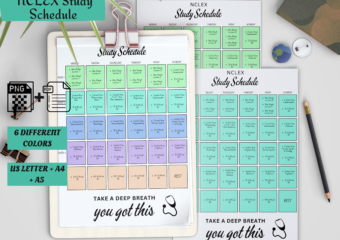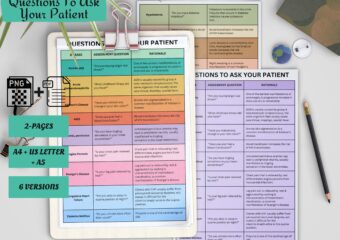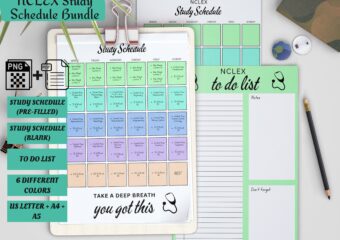What Are Considered Easy Questions On NCLEX?

- How to Write Effective Therapy Progress Notes - January 7, 2025
- How to create SMART Goals in Therapy - October 8, 2024
- MICU vs SICU: What is the difference? - March 25, 2024
The National Council Licensure Examination, or NCLEX, is an integral stepping-stone for any nursing professional. Designed to test the essential competencies required for safe and effective practice as an entry-level nurse, the exam covers a vast array of topics, making the preparation phase a considerable undertaking. However, amidst this extensive body of knowledge, there are certain questions considered “easy” by many exam-takers.
What Are Considered Easy Questions on The NCLEX?
In the context of the NCLEX, “easy” questions are those that assess fundamental principles and concepts inherent to the profession of nursing. While the word “easy” may vary in interpretation among different examinees, it generally refers to those questions that probe an examinee’s understanding of essential, foundational nursing knowledge that has been extensively covered throughout their nursing education.
These questions often fall within the purview of basic nursing care and routines, principles of human anatomy and physiology, elementary pharmacology, and widespread medical conditions. For example, an “easy” question might ask an examinee to identify a standard procedure for blood pressure measurement or recall the normal range of body temperature in adults. Similarly, it might require the examinee to demonstrate an understanding of the effects of common drugs, like beta-blockers, on heart rate and blood pressure.
“Easy” questions could also involve basic pathophysiology of common diseases such as diabetes mellitus, hypertension, or chronic obstructive pulmonary disease (COPD). For instance, a question may ask about the typical clinical presentation of a patient with poorly controlled diabetes or the primary pathophysiological process in COPD.
On another note, an “easy” question could address the key principles of patient communication and therapeutic relationships, concepts that are fundamental to the practice of nursing. Questions in this category may involve identifying proper responses to patient emotions or demonstrating understanding of the principles of patient autonomy and informed consent.
While these “easy” questions focus on the fundamental aspects of nursing, it’s crucial to remember that the NCLEX is designed to evaluate the readiness of entry-level nurses. Therefore, even these seemingly straightforward questions will require a comprehensive understanding and application of nursing concepts. To succeed, examinees must be able to apply their theoretical knowledge to real-world scenarios in order to provide safe and effective patient care.

Which Criteria Make an “Easy” NCLEX Question?
Several commonly recognized criteria can help identify an “easy” NCLEX question.
- Familiarity: “Easy” questions are typically those that test foundational concepts which are covered extensively in nursing school curriculums. They probe the topics that are most frequently encountered in textbooks, lectures, and clinical training. For instance, standard procedures for patient hygiene, basic principles of infection control, or fundamental aspects of medication administration. The more familiar a nurse is with a topic, the more likely they are to find questions on that topic easier to answer.
- Clarity: A question is likely to be perceived as “easy” if it’s presented in a straightforward manner. These questions have clear, concise wording, leaving little room for interpretation or confusion. They provide enough context to understand the scenario but avoid extraneous information that could confuse or mislead the examinee. The correct and incorrect choices are clearly differentiated, and the answer is not obscured by complex or ambiguous language.
- Basic Level: Questions are often considered “easy” if they’re at the recall or comprehension level of cognitive ability, as per Bloom’s Taxonomy. These questions require the examinee to either remember factual information or comprehend basic concepts rather than apply, analyze, synthesize, or evaluate information. They typically focus on straightforward facts or foundational principles rather than complex scenarios or multifaceted case studies that would require advanced clinical judgement.
- Single Concept: Questions that are designed to test a single nursing concept or a standalone aspect of patient care are often perceived as “easy.” These are questions that do not require the examinee to integrate multiple concepts, synthesize diverse pieces of information, or apply multifaceted clinical reasoning. For example, a question might ask about a single step in a commonly performed nursing procedure, or it might test the examinee’s knowledge of a specific physiological process.
The assessment of an NCLEX question’s difficulty ultimately relies on an individual’s knowledge, comprehension, and application of nursing principles. However, these criteria can serve as a general guideline to identify what may constitute an “easy” question on this comprehensive licensure examination.
Examples of the “Easy” NCLEX Questions
Here are a few examples of what might be considered “easy” NCLEX questions:
Question: Which of the following vital signs should be assessed first in a patient who complains of chest pain?
- A) Respiratory rate
- B) Blood pressure
- C) Heart rate
- D) Temperature
Answer: C) Heart rate
Explanation:
In a patient presenting with chest pain, assessing the heart rate is crucial as it provides immediate insights into the cardiac status. An increased heart rate may indicate myocardial ischemia or other cardiac conditions. While all vital signs are important, the heart rate is of primary concern in this scenario, as it can guide subsequent interventions and help determine the urgency of the situation.
Question: Which action by the nurse is essential when administering oral medications?
- A) Encouraging the patient to swallow the pills with a full glass of water
- B) Crushing the pills and mixing them with food if the patient has difficulty swallowing
- C) Administering the medication immediately after the patient finishes a meal
- D) Administering the medication with grapefruit juice to enhance absorption
Answer: A) Encouraging the patient to swallow the pills with a full glass of water
Explanation:
When administering oral medications, it is essential to encourage the patient to swallow the pills with a full glass of water. This helps facilitate proper medication absorption, prevents pill residue from sticking to the throat or esophagus, and minimizes the risk of aspiration. Crushing pills or mixing them with food should only be done if it is specified in the medication administration instructions. Administering medications with grapefruit juice can interfere with drug metabolism and should be avoided unless specifically indicated by the healthcare provider.
Question: Which of the following statements accurately describes the purpose of the Glasgow Coma Scale (GCS)?
- A) To assess cognitive function in patients with dementia
- B) To evaluate motor function in patients with spinal cord injuries
- C) To quantify pain levels in pediatric patients
- D) To assess level of consciousness in patients with acute brain injury
Answer: D) To assess level of consciousness in patients with acute brain injury
Explanation:
The purpose of the Glasgow Coma Scale (GCS) is to assess the level of consciousness in patients with acute brain injury. It is a standardized tool that evaluates three components: eye-opening, verbal response, and motor response. The GCS score helps healthcare professionals objectively quantify the patient’s level of consciousness and monitor changes over time, aiding in the assessment, diagnosis, and management of brain injuries.
Conclusion
In conclusion, the concept of an “easy” question on the NCLEX is largely subjective and is based on an individual’s study habits, retention of material, and test-taking abilities. While some questions may seem easier due to their focus on familiar topics, clear wording, or basic conceptual level, every question requires thoughtful consideration and understanding of nursing principles. Therefore, a balanced nursing study approach that covers all areas of the NCLEX-RN Test Plan will ensure readiness for both the “easy” and the more complex questions. Remember, the goal of the NCLEX is not just to pass, but to demonstrate the knowledge and competencies necessary for safe, effective




